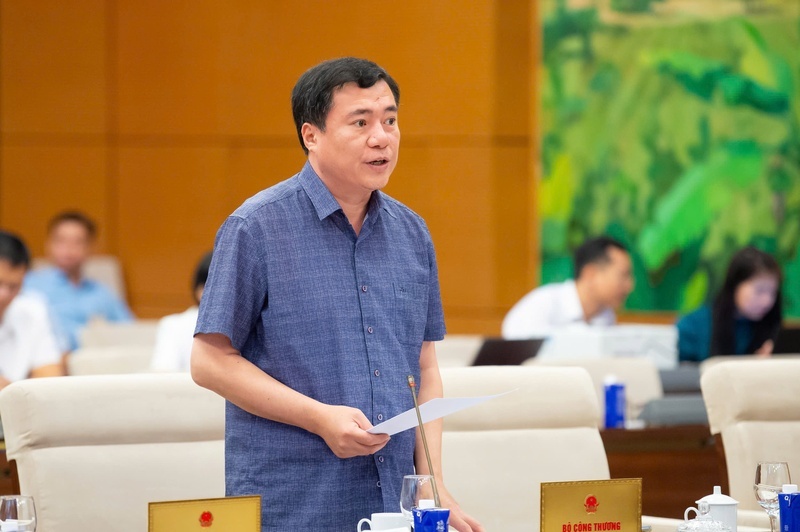INTERNATIONAL INVESTMENT
AND PORTAL
 Deputy Minister of Industry and Trade Nguyen Sinh Nhat Tan during the 49th session of the National Assembly Standing Committee
Deputy Minister of Industry and Trade Nguyen Sinh Nhat Tan during the 49th session of the National Assembly Standing Committee
At the 49th session on September 22, the Standing Committee of the National Assembly considered the draft Law on E-commerce. The draft comprises eight chapters and 50 articles and aims to modernise and strengthen the legal framework for the country’s rapidly growing online trade sector.
"Vietnam’s e-commerce market has been highly rated by international research institutions, ranking third in Southeast Asia by market size in 2024 and fifth globally by growth rate in 2022," said Deputy Minister of Industry and Trade Nguyen Sinh Nhat Tan. He added that these achievements also underscore regulatory gaps that need to be addressed.
Currently, e-commerce in Vietnam is regulated mainly under Decree 52, issued in 2013, and Decree 85 introduced from 2021. While these decrees provide a foundation, as sub-law documents they do not carry sufficient authority to address complex, cross-sectoral issues.
The rapid emergence of new business models, diverse market participants, and increasingly sophisticated practices has revealed clear limitations. Counterfeit goods, intellectual property violations and low-quality products remain widespread, while new forms of e-commerce such as livestream selling and affiliate marketing have yet to be adequately defined in law.
Livestream commerce in particular has surged in popularity, becoming a key driver of online retail. However, the law currently treats livestreams as a form of advertising attached to sales, without specific provisions for livestreamers, account holders, or platforms.
This has created a legal vacuum that complicates enforcement. There have already been cases where livestream sessions recorded massive revenues but no tax obligations were met. In some instances, celebrities promoted products such as functional foods with exaggerated claims, influencing consumer behaviour and raising health concerns. These examples underscore the difficulty of safeguarding consumers and ensuring fair taxation in the absence of clear rules.
To close these gaps, the draft law introduces mandatory authentication of sellers. Domestic livestream sellers would be required to register through VNeID, while foreign sellers would need to provide valid legal documentation. The objective is to establish accurate identification of all actors in the digital marketplace, thereby enhancing transparency, enabling tax collection, and strengthening consumer trust. Sellers would be held legally accountable for the products and services they promote, while buyers would gain greater assurance that they are dealing with verified individuals or entities.
The draft also extends responsibilities to platforms, including both e-commerce operators and social networks that facilitate commercial transactions. They would be obliged to monitor content, provide information to regulators, assist in recalling defective products, store transaction records for inspection, and prevent abuses of dominance or manipulation of algorithms that distort competition. These measures are intended to foster a healthier digital ecosystem, where competition is fair and innovation is not undermined by unscrupulous practices.
Industry observers argue that requiring VNeID authentication is a necessary step to bring the livestream economy under proper oversight. The growth of e-commerce has far outpaced the state’s ability to track revenues, leaving significant tax leakage. By mandating identity verification, authorities will be better equipped to enforce obligations and ensure that the digital economy contributes more proportionately to national revenues. At the same time, there is recognition that the design and implementation of such requirements must avoid placing undue burdens on small businesses, household traders and content creators who rely on livestream selling as a low-cost channel to reach consumers.
The challenge, therefore, is to strike a balance between regulation and innovation. If procedures are overly complex, the policy could discourage entrepreneurial activity and reduce market dynamism. On the other hand, without stronger regulation, risks to consumers and state finances will continue to grow. Policymakers will need to ensure that compliance mechanisms are simple, digital-first and accessible, while also carrying sufficient weight to deter misconduct and tax evasion.
The proposal to mandate VNeID authentication forms part of a broader effort to modernise Vietnam’s approach to e-commerce. By embedding clearer legal definitions, expanding platform accountability and introducing mechanisms for cross-border sellers, the draft law aims to align regulation with market realities. The government’s intention is to create a transparent, fair and sustainable digital marketplace, one that protects consumers, ensures contributions to the state budget, and supports responsible innovation.
If passed, the law would mark a significant shift in Vietnam’s governance of the digital economy. It would provide authorities with stronger tools to monitor activities, close loopholes that have allowed tax evasion to flourish, and build greater confidence among consumers.
More importantly, it would set the stage for e-commerce to evolve into a sector that can grow quickly while operating on principles of accountability and trust. As the National Assembly debates the details, the outcome will signal how Vietnam intends to balance growth and regulation in an era when online commerce is reshaping both the economy and daily life.



















